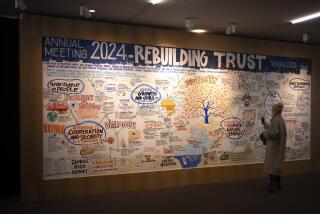U.S. leaders get gloomy view from the summit
- Share via
ASPEN, Colo. — It’s not easy to be gloomy in this sun-washed resort town, nestled 7,908 feet above the cares of the world in the lush stillness of the Rocky Mountains.
But 400 representatives from the peaks of U.S. business, academia and government who gathered here last weekend did their best.
The occasion was a symposium marking the 40th anniversary of the Aspen Institute, a combination think tank, retreat and upscale adult education center that exposes business and government leaders to the great books of Western literature and philosophy.
But the proceedings more resembled a wake for the American Century.
Under crystalline blue skies disturbed only by an occasional passing thunderstorm, the panelists surveyed the American social horizon--and found it shrouded with dark clouds.
Speaker after speaker lamented the decline of American education, competitiveness and moral fiber, the stagnation in productivity growth and the slippage of average real wages. In this enclave of $10 hamburgers, $45 designer T-shirts and million-dollar condominiums, they bemoaned the widening gap between rich and poor.
“We are en route to becoming one of the largest Third World nations on the globe,” said Leonard A. Lauder, president and chief executive officer of Estee Lauder Companies.
“With one rationale or another, we seem to be in a position of justifying retreat,” said former Federal Reserve Board Chairman Paul A. Volcker.
“All of us feel an . . . uneasiness about the next five to 10 years,” said John J. Phelan, chairman and chief executive officer of the New York Stock Exchange.
The conference opened Thursday with the presentation of a distinguished leadership award to President Bush. But once he retreated to Air Force One and the meeting got down to shirt sleeves, Bush took his lumps.
He was never criticized by name, but no one misunderstood who TV commentator Bill Moyers had in mind when he chided politicians who confuse leadership with “waving flags and refusing to eat their broccoli.”
In all, the tone at this summit meeting of the earnest, the wealthy and the powerful was as grim as the platform-writing sessions at the 1988 Democratic National Convention.
Only occasional shafts of optimism peeked through the gray. For all the nation’s problems, Phelan observed, it remains a magnet for ambitious people all over the world.
Harvard international affairs professor Joseph S. Nye Jr. complained that the bleak assessments of American competitiveness only presented “one-half of the ledger.” American Federation of Teachers President Albert Shanker noted that, despite all the holes in the educational system, as a nation we graduate a far higher percentage of students from high school than 50 years ago.
As often in these international gatherings, the most encouraging prognosis for America came from a gracious Japanese guest. Former Japanese Finance Minister Kicchi Miyazawa declared that “eventually the U.S. will be the greatest nation in the world”--although, he allowed, only after an economic restructuring that “will not be an easy process.”
All this was less striking for its content--the catechism of American decline has been a staple of public policy conferences since the publication of Paul Kennedy’s “The Rise and Fall of the Great Powers”--than its source.
These grave warnings about the erosion of leadership came primarily from people who are themselves leaders--an incongruity that at once underlined the pervasive concern about many of the trends in American life and the inability of anyone to effectively mobilize that sentiment behind any agenda. Nothing was more apparent than the eroding confidence of these opinion leaders that the people living in the foothills and lowlands care much about their opinions.
Sunday morning, the conferees listened to Moyers and Barbara Walters lead a panel that summarized the previous days’ indictment of American drift, then the dignified notes of the American Brass Quintet, and finally a vigorous call for “a new global community” from British Prime Minister Margaret Thatcher. Then, inspired or discouraged or confused, they filed out toward paneled rooms and four days of accumulated messages in Washington, Boston, New York and Los Angeles.
And on the trails beyond the conference center, mountain bikers in neon Gor-tex and skintight Lycra chased the cool summer breeze, just as they do every August, no matter how the tides of history are running.
More to Read
Sign up for Essential California
The most important California stories and recommendations in your inbox every morning.
You may occasionally receive promotional content from the Los Angeles Times.













